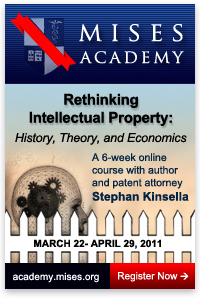Rethinking Intellectual Property: Kinsella’s Mises Academy Online Course
Education, IP Law My article, Rethinking IP, was published yesterday on Mises Daily. It details the content and purpose of my upcoming Mises Academy course, “Rethinking Intellectual Property: History, Theory, and Economics,” Mises Academy (March 22, 2011 – April 29, 2011).
My article, Rethinking IP, was published yesterday on Mises Daily. It details the content and purpose of my upcoming Mises Academy course, “Rethinking Intellectual Property: History, Theory, and Economics,” Mises Academy (March 22, 2011 – April 29, 2011).
This is a 6-week course and will run starting March 22, 2011 (on Tuesday evenings, 9pm EST) and will provide an overview of current intellectual property law and the history and origins of IP. This is the second time I’ve offered this course (the first offering, during Fall 2010, being very successful), and my third Mises Academy course (I am currently teaching Libertarian Legal Theory: Property, Conflict, and Society). Click here to read my reflections on teaching the Rethinking IP class the first time.
Here is some feedback provided by past students of this course:
“The class (everything) was perfect. Content wasn’t too deep (nor too shallow) – the reviewed material was just brilliant and the “tuning” was great for someone like myself (engineering background – no profound legal/lawyer experience). It provided all the material to really “understand” (instead of “just knowing”) all that was covered which I find always very important in a class.”
“Instruction was very comprehensive and thought provoking. The instructor was fantastic and very knowledgeable and answered every question asked.”
“Learned more then i expected, the professor seemed to really enjoy teaching the class, and the readings provided were excellent. Overall for the cost I was extremely satisfied.”
“Very interesting ideas I was not exposed to. Inexpensive, convenient, good quality.”
“It is a very fascinating topic and I was quite eager to learn about what I.P. is all about. I thought that Professor Kinsella was able to convey complicated issues to us clearly.”
“Professor Kinsella’s enthusiasm and extra links posted showed his true knowledge and interest in the subject. Great to see.”
As noted, live online lectures will be Tuesdays at 9pm EST, with Office Hours later in the week, probably at 7pm London time.
Sign up!
Rethinking Intellectual Property: Kinsella’s Mises Academy Online Course Read Post »
